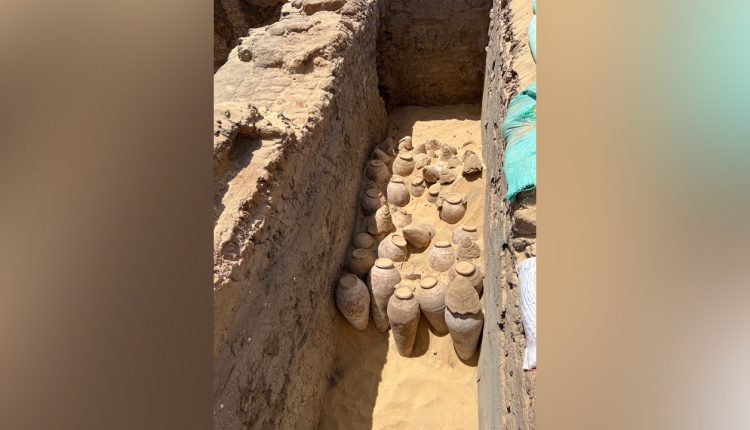Egyptian queen tomb discovery yields sealed jars of wine from 5,000 years ago, plus ‘exciting information’
Scientists have discovered sealed jars of wine from 5,000 years ago in an Egyptian queen’s tomb.
The find, one of the oldest ever, was among the “grave goods” for Queen Meret-Neith in Abydos, from 3,000 BC, according to SWNS, the British news service.
The University of Vienna researchers say she was the most powerful woman in the period and possibly the first female pharaoh of Ancient Egypt.
PREHISTORIC FOOTWEAR WAS DISCOVERED IN SPANISH CAVE BY MINERS, SCIENTISTS REVEAL
Queen Meret-Neith was the only woman to have her own monumental tomb in Egypt’s first royal cemetery at Abydos.
While her true identity remains a mystery, the excavation revealed hundreds of jars of wine — some still sealed — buried with her.
Meret-Neith’s monumental tomb complex in the Abydos desert, which includes the tombs of 41 courtiers and servants in addition to her own burial chamber, was built of unbaked mud bricks, clay and wood.
“The wine was no longer liquid and we can’t tell if it was red or white.”
Inscriptions indicate that Queen Meret-Neith was responsible for central government offices such as the treasury, which supports the idea of her special historical significance, the scientists revealed.
Archaeology professor Christiana Köhler from the University of Vienna in Austria, who led a German-Austrian team of researchers, said that a lot of the finds are undergoing analysis to reveal their secrets.
“The wine was no longer liquid and we can’t tell if it was red or white,” she said, according to SWNS.
“We found a lot of organic residue, grape seeds and crystals, possibly tartar — and all of this is currently being scientifically analyzed. It is probably the second-oldest direct evidence for wine — the oldest also comes from Abydos,” she also said.
She added, “The new excavations bring to light exciting new information about this unique woman and her time.”
The archeological team found evidence of a huge amount of “grave goods,” including hundreds of large wine jars.
Some of them were well-preserved and still sealed in their original state, containing the remnants of 5,000-year-old wine.
Thanks to careful excavation methods and new archaeological technologies, the team was able to show that the tombs were built in several construction phases and over a relatively long period of time, SWNS also reported.
The team is working together with the Egyptian Ministry of Tourism and Antiquities, the German Archaeological Institute in Cairo, the University of Vienna and the Vienna University of Technology in Austria and Lund University in Sweden, according to SWNS and a press release from the University of Vienna.
For more Lifestyle articles, visit www.foxnews.com/lifestyle.
Read the full article here

